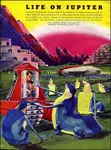the fire, the light, the cold:
ray cummings' mercury
Tama of the Light Country (1965) and Tama Princess of Mercury (1966) slipped into the genre just in time -
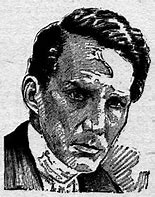
Stid: You mean, the above publication dates coincide with the scientific proof that Mercury turns on its axis...
Zendexor: And so, woe to the old perpetual Dayside, Nightside and Twilight Belt - promptly banished to OSS dreamland. Nowadays, half a century later, some publishers have woken up to the fact that there's nothing wrong with dreamland, but in the Sixties it was thought that if a tale's scenario blatantly contradicts scientific fact, the book won't sell.
Stid: A strange attitude. And not adhered to with any consistency.
Zendexor: Well, like I've just implied, the publishers are wiser now. What makes a tale deserve to succeed is not its degree of hard scientific fact but the extent to which it is true to its own nature - and that's the issue we'd better turn to right now, for Harlei is dancing with impatience.
Harlei: Yes, hurry it up, you two! 'Cause what I want to know is, are the Tama books any good or not? Are they duds like the Thanator books or roaring successes like Amtor and Barsoom?
Zendexor: On that spectrum, I'd say they lie about midway.
land and people of the light country
Around the Hill City is a barren waste of metallic coppery hills, jagged spires, canyons like gashes filled by some Titan metalworker in mountains of metal. Bleak landscape! For miles there is no blade of vegetation; no soil, save a metallic dust, worn by the rain and wind. Pools of water from the rain lie glistening in all the hollows...
This is the Light Country, the best region of Mercury. It is not quite so forbidding. There are oases - valleys where rock which was not metal has been worn into a soil. In them, with the abundant rainfall and the heavy humid heat, there is always luxuriant tropical vegetation, great spindly shafts of trees, flimsy and porous, and air vines with giant spreading leaves and vivid, exotic flowers.
Harlei: Well, this is promising! And what about the people?
Zendexor: You'll find some originality here -
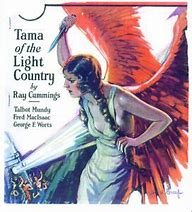
I shall never forget my first meeting with Tama. Like all Mercurian women she is winged with those sleek feathered wings which are the cause now of our disaster.
I am not one to try to explain the purpose of an all-wise Creator in thus endowing the females of this world. I think perhaps there is a logical justice to it. The male is created to pursue, to capture, and enslave the female. At least, it was so on Earth throughout the early history of mankind.
But the women here are by nature given the means to be free. They are slight of body, small of stature - I suppose an average height at maturity would be four feet six inches, with a Mercutian weight of forty pounds or less. Winged from the shoulder with a ten-foot spread, they fly like an albatross.
They are free by nature. But man could not let it rest like that. At marriage, to insure [sic - ensure is meant] submission to the will of her husband, the wings are clipped so that she may no longer fly - a cruel mutilation, an intolerable humiliation...
The rebelliousness of the virgins intensified for generation. Then, just about a year ago, a leader arose to fire them into deeds - a young virgin, inspired with the desire to right this wrong...
Zendexor: This is where I must confess to a mistake. An error of literary judgement. Decades ago, when I had my first attempt at reading the Tama books, I was put off by what seemed the ridiculously twee winged women - put off so badly, that my expectations had plummeted to around zero by the time I gave the books another try just recently.
This time round, therefore, I must guard against the opposite fault. I must take care not to make the saga out to be better than it is. So let me say at once, Cummings is no Burroughs. On the other hand, he's achieved something. He's built a Mercury which adds something to the lore of that special world.
A storm seemed impending this evening. The normal daylight was gone. Heavy clouds were gathered close overhead, slowly circling in a lofty wind, the forewarning of a black storm. With ending of the cycle, darkness fell on the city, as dark as I remember it on an overcast, stormy night of Earth. But there was no surface wind - only a heavy, steaming oppressive stillness, and a lurid green sheen in the air. A sinister portent of evil came with these Mercutian storms; and sometimes it was justified.
The storms whirled at times from the Fire Country, with a fetid, fiery, blasting breath. Or again, from the Cold Country of eternal blackness, with a sullen roar and a congealing cold...
Harlei: A suitably unfriendly place. You don't want Mercury to get too friendly.
Zendexor: Because if it starts to seem too comfortable, it ceases to follow the OSS "template", if you like. Yes. On the other hand there must be some patches of relief from the harshness.
The trees arched overhead, great spreading, spindly branches of the lush, porous vegetation of Mercury which grows with miraculous speed wherever there is soil and water. Through the tree branches I could see the luminous green haze of the sky. And nearby, spreading around us, was the circular city - mere dots of light now, winking like eyes in the murky, abnormal darkness of the coming storm...
Harlei: A city! Please let it be good.
Zendexor: It's not bad, it's just rather vaguely described, like something seen through mist. Fortunately that quality matches rather well with the literal fogginess caused by the weather conditions on Cummings' Mercury. The cities are therefore just about good enough for the tale. (Though the author could have done better with his names... "Hill City" and "Water City" don't set the romantic pulse racing.)
The best detail we're given is that of the "brues".
impressionist beasts, metal, cold
A city cart passed us, drawn by a gruesome, insect-like brue, a giant jointed thing...
...The brue in the cart harness stretched its jointed length at ease along the ground and lifted its head with an uncanny pseudo-human movement, as though listening...
Harlei: Impressive - though also merely impressionistic.
Zendexor: A good way of saying it, Harlei. It's the same with the people. Take for example the
...gray-skinned, heavy, dull-featured men from the Cold Country...
Crude, violent, like the landscape, areas of which have their own special metallic character:
...Boulders lay strewn about and rifts yawned like black gashes in a wild confusion of metal rock. The smooth places gleamed like burnished copper in the brief red lightning-flares of the storm...
Stid: Hey, if I may just interrupt a moment, this is not too stupid! Mercury is (along with Earth) the densest of the planets, the one with the highest proportion of metal in its composition.
Zendexor: Well, there you are, a little narrow straight where OSS-land and RSS-land almost touch, if you will forgive the cartographic metaphor.
Harlei: Tell me more about the Mercurians. Do they have an advanced civilization like the red men of Barsoom? Or are they primitives...
the level of mercurian civilization
Zendexor: You want them not to be primitives, don't you, Harlei - I can tell by your tone of voice. I'm mostly the same - though I've grown to like the Stone Age folk of Pellucidar. I was going to say, plots are likely to be more original if the culture will bear some complexity. But of course that doesn't quite work as a principle - for "primitive" cultures can be plenty complex enough for complex plots - see Jean Auel's The Clan of the Cave Bear series. Still, it's fun to have both, which is what the red men of Barsoom enjoy, with their swords and their fliers. Well, the Cummings Mercury - to answer your question - is part-way there:
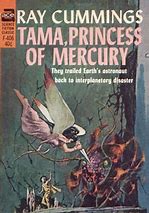
There are no weapons used in the Light Country of the sort which on Earth would be called modern. Explosives are unknown. There are knives, feathered arrows flung with a sling, and several devices for longer range, mostly of the catapult principle - crude, mechanical things.
But I understood that the government had small electronic weapons, and defensive electro-armament. There is an electro-magnetic current known to the Light Country scientists. I suppose it is something akin to what is called electricity on Earth. But I had never seen the weapons developed from it...
Stid: I sniff the theme of decline...
Zendexor: You're right. We must diagnose a clear case of declinism:
...Centuries ago, the Light Country civilization had reached a higher peak than now. There had been many wars with the neighbouring savages of the hotter and colder regions. With these declining, and the population of Mercury steadily decreasing, the Light Country began turning primitive...
authorial hits and misses
Zendexor: This sort of declinist stuff has the usual result, that I begin to shift my interest to the unavailable past, rather than the decayed present. But instead of doing that, I ought to focus on the present, to appreciate what I've got in front of me, a tale with its moments of beauty and effective writing:
The turgid green of the sky caught the raindrops and turned them all to emeralds, and to rubies when the lightning flashed in puffs like crimson bombs...
Harlei: Moments, did you say? Only "moments" of effective writing? Oh, dear me, that doesn't sound too good, Zendexor.
Zendexor: Well, what do you expect? If this author had been another Burroughs or Wells, we would have heard about it by now, would we not? Instead of which, as things are, we're dealing with a second-rater who nevertheless shouldn't be dismissed. This page is not easy to write; it's my balancing act between over- and under-estimation. And the author makes it all the harder for me, with his blend of incompetence and strange magic:
I was suddenly aware of a sound close behind me, a strange sloshing. A brue was slithering forward through the water and mud of the path. In the lurid half-light its eyes gleamed balefully - a gruesome thing, ten feet long. Its upraised head, as it advanced, was nearly the height of my own; its feelers - muscular arms the length of the body, with the strength to crush me - waved over its head...
The use of the word "thing" isn't great, yet in a first-person narrative it can validly reflect the character of a blunt, un-eloquent narrator. The rest of that description is top-notch in my view. Cummings is at his best when conveying the view of Mercury as a drenched, violent little world:
The whirling rotary clouds were at times close over us - green and red vapor masses, hurling rain and wind heavy with sulphur.
The clouds sometimes rifted into gigantic vertical funnels through which the clear daylight of the sky was visible. It brightened the scene, and the bleak, desolate landscape beneath us was at those moments clearly shown as great rippled sheets of metallic plateau, drenched with water - shining coppery, then cast with green - or blinding red when the lightning puffed - or again, a wild, broken area with spires and crags and boulders strewn as though some frenzied Titan had flung them...
Stid: Careful you don't get carried away or you'll have to call 'em great books after all.
days and nights keep creeping in
Zendexor: All right, let me cast about for some brickbat to throw. Here's one: the business of "day" and "night" on Mercury. You just have to hope, as in Leigh Brackett's "Shannach - The Last", that the supposed transitions between day and night refer merely to some slight planetary wobble - or that it's to do with a biorhythm...
That night-cycle passed and the next day began. Day and night were alike in the darkness of the storm...
"Cycle" suggests the biorhythmic explanation; but then "darkness of the storm" suggests more confusion - as though if it were not for the storm we might see night follow day... and at another point the "axial rotation" of the planet is referred to as one of the facts "unknown to us" about Mercury. Careless, careless! And then there's the case - here I'm warming to my theme - of the Mercurian on Earth who does not seem to suffer much from Earth gravity even though it's three times what he's used to...
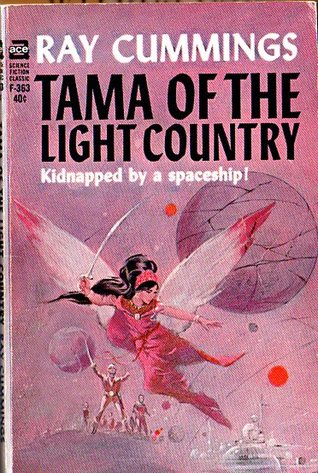
Harlei: Maybe you can blame it on the narrator rather than the author. A chap from Earth finding himself on a stormy Mercury might get confused. Especially if he's from the naive days of OSS exploration.
shining and slapdash
Zendexor: True, and that naivete gives the book a certain freshness, that of the newness of space travel, which allows characters to exclaim upon how marvellous it is:
Rowena pointed to the Earth. "It's dwindling. Our little Earth - how small it looks now, Jack!"
Stid: The naivete extends to an Alfred-Bester-style disproportion regarding the pull of gravity: a slap-dash account has two space-suits exert a noticeable pull on one another!
Zendexor: Yes, I noticed that similarity with Gully Foyle's comet-like train of space-debris in The Stars My Destination. That kind of thing doesn't bother me at all. I'm topological rather than scalar in my use of science-themes... and in justice to Cummings I might add that the winged Mercurian heroine Tamar does find it more difficult to fly on Earth.
Stid: So there's that much realism anyhow...
Harlei: All you need is realism of mood. Create a Mercury with the right mood and you've hit the literary target.
Zendexor: That's it, in a nutshell. And all in all, Cummings does sell us the right goods. We sense we're being given an authentic Mercury as we approach it from space:
the proper deal
Gazing down at the great spread of vapor masses, I saw a gray-black tumbling sea, with rifts of fire in it - electrical storms tossing the clouds. Gigantic whirlpools of vapor appeared sucking huge circular holes with tossing flames edging them. Leaping bolts of jagged lightning slit the atmosphere.
And then, a sea of mist, shining opalescent with the sunlight on it; and a chasm in the clouds, with rain beating across it, and the sunlight catching the raindrops, spreading them with great shafts of prismatic color.
There was a vast area where the sea of clouds hung lower to the fiery surface - a boiling, bubbling sea, the spread of a giant cauldron with red-green volatile liquid boiling up its crimson sediment.
The surface of the Fire Country was seldom visible; but once, through a great rift, I saw a spread of rocks - peaks and spires. As the blistering sun-rays went down, diffused and radiated by the heavy air, it seemed that one of the mountain peaks burst with a jet of steam, edged with green burning gases. And then the clouds closed the rift.
Stid: As bad as Blish's Jupiter, almost.
Zendexor: But the Fire Country is not all there is.
Beneath my window I saw a great spread of naked landscape - the Light Country, fairest region of the planet! The daylight glistened on the naked surface of bleak, metallic hills. There had recently been a storm; the burnished hillsides were wet with moisture, and little rills and pools of water filled the rock depressions...
An undulating metallic plain, and off to one side a range of naked little hills, with buttes, square-sided, flat-topped, and spires like pointed minarets rising against the flat monochrome background of the sky...
We passed almost over a valley. Soil was there. Porous-looking trees, suggesting a mushroom growth, fringed a little lake. There were small areas with a red soil plowed up...
And so you get settled areas:
The little line of jagged hills had behind it a sheer drop of perpendicular copper walls, clean as though cloven by Titan's knife. Beyond them the contour was a wide-spreading, shallow oblong bowl, with gentle slopes undulating upward to other heights at the distant horizon.
A small inland sea had once been here. It was gone now but, at the bottom of the depression, water still collected, making a little lake some two miles wide, with the city houses built on stilts and water trees - a spring-fed lake of turgid, warm water rising from the fire-heart of the planet.
The copper precipice stood against the lake; to the left it straggled into a marsh as the land rose up. There were fields on the terraced hillsides off there, spreading in a great semicircle beyond the lake - terraces of water and mud in which something like rice might be growing...
Enough variety of scene, to act as backdrop for a quite interesting culture clash between different Mercurian factions, divided as to how to treat their winged women. I shan't go into the plot, for my main concern is the setting. I will end with a passage which is suggestive of development: taking the reader forward from "being presented with regions of Mercury" to "travelling on Mercury from one region to another".
It's the bit where we're being taken towards the Cold Country, and the geology undergoes a transition from copper to iron.
The sky was leaden. But as I gazed, with my eyes growing accustomed to it, there seemed a vague green sheen of radiance mingled with the clouds. Green, and occasionally dim shafts of a turgid yellow. The window was open with a small sill, breast-high, on which I leaned. A wind was outside; but I guessed it was only the creation of our forward flight. The night was breathless - oppressive...
I stood there perhaps an hour, watching the dim landscape slipping past. A dark metallic plain fluted with little rifts and gullies. It seemed steadily rising toward us. As the ball slowly turned on its axis [what!!! careless again - OSS Mercury shouldn't "turn"], my view spread to the horizon over all its circle. A close upstanding horizon, black against the sky. The plain was gradually breaking into rougher country: deeper gullies, round black pits - unfathomable emptiness downward, and little crater holes, like pockmarks...
...I was aware of the air growing constantly colder. And the night darker. Not so much because of the storm; we were advancing, I knew, into the region of perpetual night...
Extracts: Storms and sparse growths on metallic Mercury - Hastening out of a Mercurian city
See the Ray Cummings section on the Authors page for other works.













